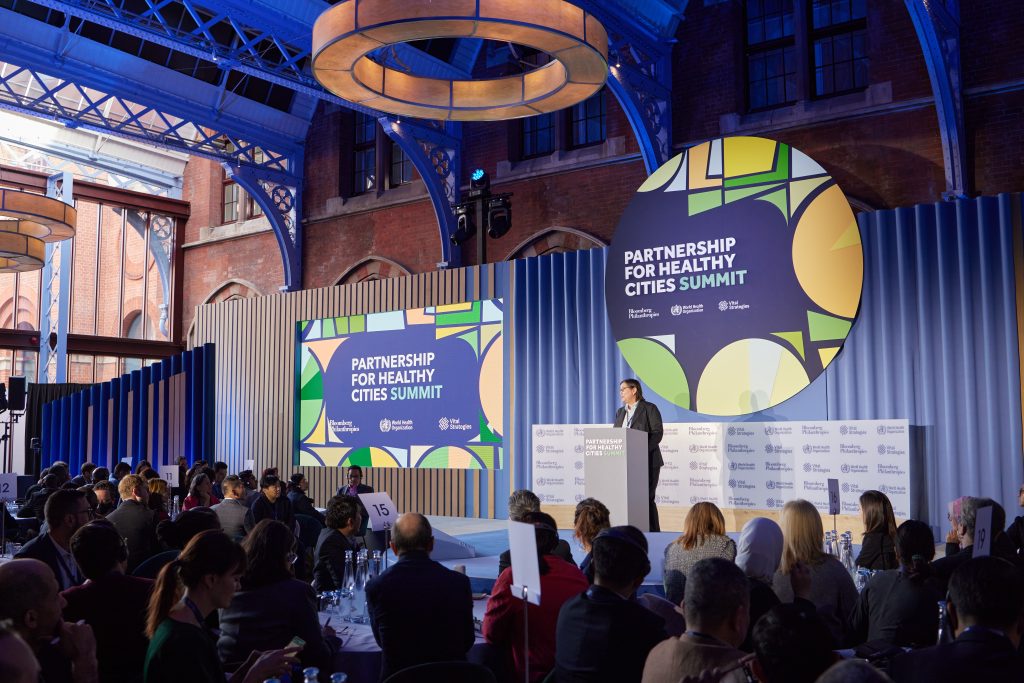Local Level Action is More Important Than Ever – Key Takeaways from the Partnership for Healthy Cities Summit

By Dr. Kelly Henning, who leads Bloomberg Philanthropies Public Health program
As the world slowly recovers from the COVID-19 pandemic, we must continue to remain vigilant and prioritize public health. On March 15, we wrapped up the first-ever Partnership for Healthy Cities Summit in London, and the conversation and information sharing made it clear that successful public health initiatives at the local level can inspire further action at the national and global levels – and save millions of lives.
During Mike Bloomberg’s time as mayor, his administration and the New York City Department of Health and Mental Hygiene, which I was a part of, took bold steps to implement preventative measures aimed at improving public health and reducing health disparities throughout the city. These initiatives, including banning smoking in public spaces, promoting physical activity, and implementing calorie labeling initiatives, found significant success. We then wanted to share what we learned in implementing these initiatives so that other cities could benefit. This is what motivates Mike in his role as WHO Global Ambassador for Noncommunicable Diseases & Injuries and inspires the Partnership for Healthy Cities to scale best practices and advance proven interventions.
What is the Partnership for Healthy Cities?
Supported by Bloomberg Philanthropies in partnership with the World Health Organization (WHO) and Vital Strategies, the Partnership for Healthy Cities was created in 2017 to enable cities from around the world to deliver a high-impact policy or programmatic intervention to reduce noncommunicable diseases (NCDs) and injuries in their communities.
Today, this partnership has grown into a network of 70 cities throughout the world, each receiving support to implement at least one of 14 proven interventions (e.g., creating a smoke-free city, regulating food and drink marketing, reducing drink driving, promoting active mobility, or enhancing public health data monitoring systems) to prevent NCDs and injuries. This network of cities covers 300 million people, and we have continued to build strong momentum that provides mayors and city leaders with a support network to advance public health.
The momentum behind city-driven public health initiatives was center stage this month when we brought together more than 200 city mayors and leaders throughout the network for the inaugural Partnership for Healthy Cities Summit.

The importance of local action was highlighted throughout the Summit, showing how incremental policy changes and efforts at the local level can save lives from preventable deaths. While in London, I witnessed this firsthand while visiting a local pre-school that focuses on healthy eating. I was encouraged to learn about the impact this work has on children and families as part of London’s broader food policy efforts with the partnership.
Coming together, and having the opportunity to see and hear about public health initiatives in action, drove dialogue that contributed to shared learnings and collaboration. A great example of the Partnership for Healthy Cities network in action is the collaboration between Greater Manchester and Melbourne, where Greater Manchester’s smoke-free city initiative has been informed by Melbourne’s advancement of smoke-free spaces.
Providing opportunities for leaders to share their progress will help to catalyze even greater action on public health policies. Underscoring this, we recognized five outstanding cities during the Summit for their efforts in addressing NCDs and injury prevention at the local level. More details about the awards given to Montevideo, Uruguay for food policy; Mexico City, Mexico for road safety; Vancouver, Canada for surveillance; Athens, Greece for overdose prevention, and Bengaluru, India for tobacco control can be found in my most recent LinkedIn article.
The inaugural Partnership for Healthy Cities Summit was a prime example of the power of collaboration, and I am inspired by the willingness of cities to help other cities fast-track their own lifesaving initiatives. While every public health challenge is complex and nuanced, by starting locally, we can identify and address the unique health needs of a community. It is then that we are able to test ideas and share successes that can advance public health and prevent needless injuries and deaths at a global scale.
We still have work to do, but I am confident that the connections we have made and information we have shared through the Summit will enable us to do even more to help people around the world live healthier, safer lives.
I have shared additional highlights throughout the Partnership for Healthy Cities Summit on my LinkedIn and Twitter. Follow along or subscribe to my newsletter to keep up with all of the public health work Bloomberg Philanthropies is doing.
Read More:
Opinion: Now we must tackle the next frontier in public health (Michael R. Bloomberg and Sadiq Khan, Evening Standard)
Opinion: Trading Cars for Bikes: 1 Way Cities Are Improving Health (Kelly Henning and Ariella Rojhani, Global Health NOW)